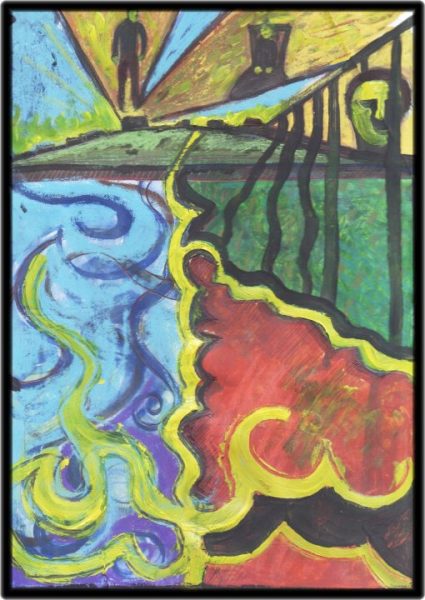The resounding theme from this years Roxy Arts house and QMU collaboration project for Drama and Theatre Arts graduates, is the quest for identity. Whether that’s in the community theatre projects, which tackle everything from youngsters concerned with their body image to prisoners, or the performances from the Contemporary Performance in Action students and the directing students. As you’d perhaps expect for a burgeoning generation there’s a yearning to discover who created us and how we are defined by a history we have yet to understand.
Kicking off the evening’s events is The Dress Affair. Originally written as a poem by Brazilian writer Carlos Drummond de Andrade while the country was under military dictatorship, this adaptation by Rob David explores how a sense of self can be found through the opposite sex. The play focuses on Wife (Danielle Farrow) and her psychiatrist (Andrew Henry). The enigma comes as the dress arrives, a sultry lacy garment that Wife claims has stolen her husband.
On a sparse set where a wardrobe provides the entrances, the action slowly uncurls, with Iain Orr’s lusty piano and Declan Pleydell-Pearce’s hypnotic guitar providing the Latino element. Under Flavia D’Avila’s direction, the passion and jealousy of Wife manifests itself in frustrated dance that Farrow embraces to the extent that the boundary between where she ends and the dress begins blurs. Like the tortured mind it came out of, this short piece battles with any kind of resolution, using the dress as the symbol of power and freedom for the repressed, be it country or womankind.
Our collective unconscious is becoming deeply wounded by a continued neglect of the organic self
Then there’s Scott Smith’s devised performance Path and another attempt at discovering a sense of identity, this time against a backdrop of fix-it-quick culture where symbols of the Orient are stolen and exploited by the West in a bid to discover our primal selves. Smith begins frozen with a smoking bowl on his head and slowly begins to unravel, exploring sand and water in a bid to reacquaint the body with the mind.
In a society as deeply rational as ours in which the only things we value have a price tag (one of the reasons of course why we’re so utterly dumbfounded by terrorists who have an over-abundance of faith – however misconstrued an interpretation of Islam that may be) spiritualism is reduced to yet another commodity. But how much of this performance is a comment on that materialistic interpretation of spirituality and how much it actually is just a piece of new age nonsense is somewhat unclear. But this is an impressive piece of body contortion that challenges the nature of real spirituality.
Everyone involved should be pretty chuffed with themselves
How much we fight for tradition and how much we allow change for the benefit of forces beyond our own lives is an issue of particular importance as we face sacrifices for the sake of the planet. At the centre of Iain MacDonald’s trilogy of Highland plays Driftwood, is the struggle for recognition, power and ownership over land, which has plagued the more northerly parts of Scotland in particular, and is now under a new threat as windmills encroach on the land.
With nothing but an old chest of trinkets, Peter Gordon and Sinead MacInnes perform the two-handers flipping character with a simple costume adjustment. With a haunting score from Mairi McLennan and Jamie Wallace throughout all three pieces, the sense of the mythic past is evoked with a bitter sadness. Edging on the monomaniacal, the actors struggle in maintaining this feeling of heightened drama but as the final piece; George Gunn’s The New Purgatory begins, the characters become more complex. With the impending threat of business men wielding energy efficiency as their tool to gain ownership, it feels as through Gunn is marking out a change in the future of the Highlanders and indeed all Britons. As we become consumed by land ownership, thanks to our inheritance of colonial blood perhaps, the consequences are revealing themselves.
But this battle between man and machine rages on, and in James Fletcher’s Terminator 2000 or the Battle Between Good and Evil, we face Fort Kinnard in 2029 after nuclear war has devastated the world; all that’s left is a robot with a piñata for a head…
With flashing eyes, expert comic timing and some titillating audience participation, Fletcher delivers an immersed twenty minutes. But what’s most impressive about this piece is its ability to intelligently tap into a cultural zeitgeist whilst maintaining a light-hearted element. There’s a yearning for tradition and a desire to reconnect to history flowing from this piece, a feeling that our collective unconscious is becoming deeply wounded by a continued neglect of the organic self.
Rather than creating an overtly political voice, what the fourth year DTA from QMU have produced is more revealing in terms of its content than its execution. This is a university which like few others, has uprooted its base and charged it’s students for the privilege, whilst failing to build an effective drama department. It is a credit to the enthusiasm of the students that this graduation showcase was a success in the face of minimal assistance both financially and emotionally from the university itself. Everyone involved should be pretty chuffed with themselves.
